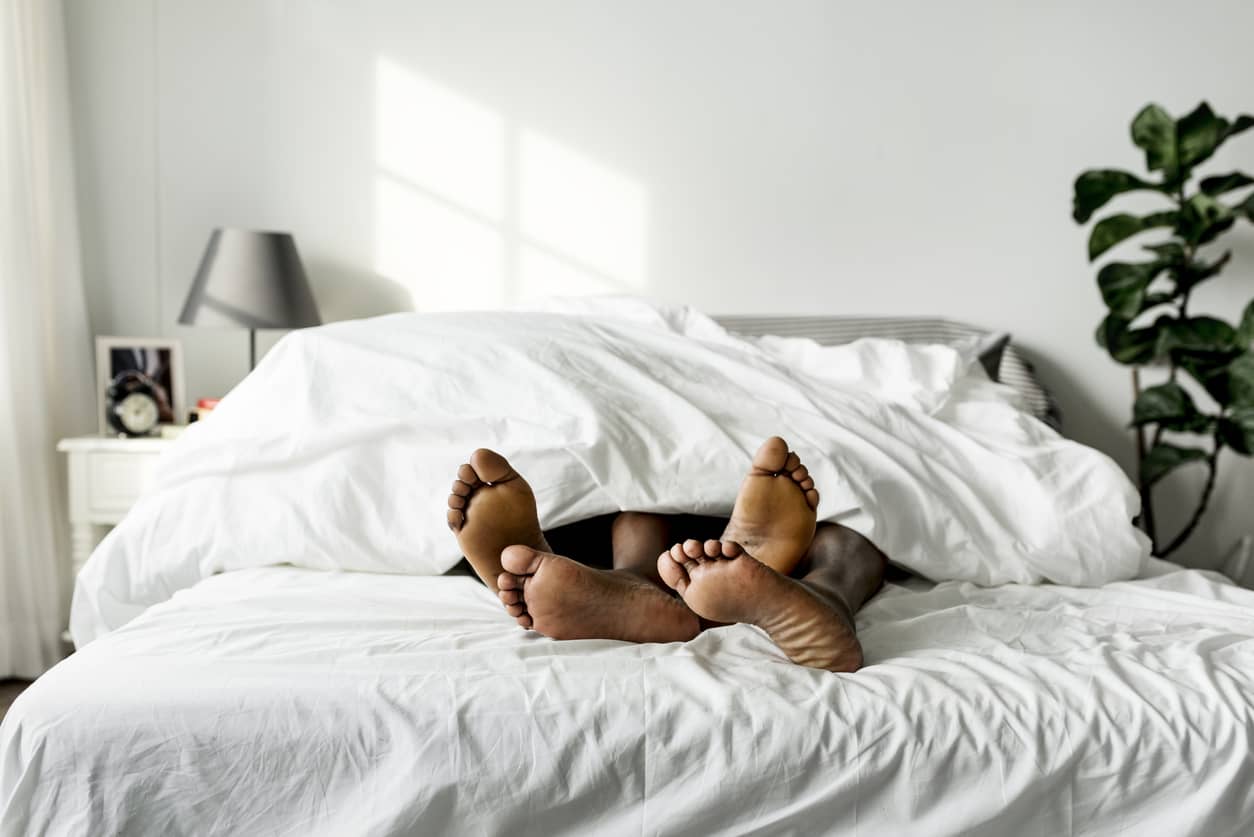Should I be worried about my low libido?
When you have a low libido, or sex drive, you feel less interested in sex – and this means you may not think about it or have it as much as you usually would, or at all. It’s a common problem that affects everyone at some time and it usually isn’t something to worry about.
Sex drive varies from person to person – what seems ‘normal’ to you may be unusual for someone else. It can feel low or high, or somewhere in between, and it can change at any stage of your life depending on many factors. These include your physical and mental health, hormonal changes, sleep quality, how you feel about your partner and your stress levels.
If your libido has been low lately, it may naturally return to whatever is normal for you in time. But, there are also some changes you can make to your lifestyle or relationship that may help increase your sex drive. If these don’t work or you have an underlying medical condition that you think may be affecting your libido, speak to a doctor.
How to increase your sex drive naturally
There’s little evidence to suggest that certain plants, foods and spices thought to increase sexual desire – known as aphrodisiacs – work. So, in this article, we focus on changes you can make to your lifestyle or relationship that may help increase your sex drive naturally, without using medication.
Fight tiredness and exhaustion
Regular exercise is a good place to start if tiredness is affecting your interest in sex. This is because physical activity can boost your energy levels and your sex drive. Exercise also releases endorphins (your body’s ‘feel-good’ chemicals) that can improve your sleep and help you feel less tired and have more energy.
It’s recommended that adults get at least 150 minutes of moderate exercise every week. If you find it hard to stick to a daily exercise regime, find an activity you enjoy and mix up the type of exercise you do. Yoga and pilates can also help to keep you strong and flexible, which may also help sexual performance.
Poor sleep is linked to a lack of exercise and stress, but it’s also linked to a reduced sex drive. It’s usually recommended that you get around 7 to 9 hours of sleep per night, but the quality of your sleep is also important for your physical and mental health and may help your sex drive.
Try keeping a regular bedtime, making sure your bedroom temperature is between 18 and 24C, and winding down before going to bed. You can do this by:
- reading a book
- taking a warm bath
- practising some light relaxation exercises like mindful meditation or deep breathing
See a doctor if you're worried about feeling tired or poor sleep.
Read more about natural remedies for a good night’s sleep.

Address problems in your relationship
If you think a relationship problem might be affecting your sex drive, you may find it helpful to sit down and have a conversation with your partner. Talking about sexual problems can be difficult, but opening up to your partner may help you feel less anxious about any issues in your relationship.
If you’re finding it hard to solve your problems together, a doctor may be able to help you by referring you and your partner to a relationship counsellor.
Tackle stress, anxiety and depression
Feeling stressed, anxious or overworked, can lead to a drop in your libido. If stress and anxiety go on for a long time, it can affect the production of the hormone testosterone in your body, which may further lower your sex drive.
Some ways to reduce stress and anxiety at home include exercising and practising mindfulness or doing deep breathing exercises.
Depression can also make you lose interest or pleasure in doing things, including sex. If you think that you may be depressed or your anxiety is becoming a problem, you should see a doctor, so they can discuss treatment options with you.
Limit alcohol
Drinking lots of alcohol can reduce how much testosterone your body makes, which may lower libido in people with male sex organs. It can also make it harder for you (regardless of your sex or gender) to reach orgasm by interfering with the signals between your genitals and your brain.
If you think you may be drinking too much alcohol, try cutting down by setting yourself a limit before you start drinking, or deciding on an alcohol budget that you’ll stick to over the course of a week. Discover some more tips to help you cut down on alcohol.
You may also find that it helps to choose smaller drinks, like a bottle of beer instead of a pint, or a small wine glass instead of a larger one. Work out how many units of alcohol are in your favourite drink.
See a doctor if you think you may drink too much alcohol (alcohol misuse). Read more about how to get support for an alcohol problem.
Get help for medical conditions or medication
Low libido can sometimes be a symptom of an underlying medical problem or the side effect of medication. These conditions may include:
- low testosterone
- type 2 diabetes
- obesity
- an underactive thyroid (hypothyroidism)
- heart disease
- erectile dysfunction, painful sex or vaginismus
Medicines like hormonal contraceptives and those used to treat high blood pressure, depression, fits (seizures) and prostate cancer may lower your libido too.
Discover more about the medical causes of low libido and your treatment options.
Cope with your decreased sex drive during pregnancy and parenthood
Pregnancy, giving birth and breastfeeding can change the balance of hormones in your body, which can reduce your sex drive.
Pregnancy and becoming a parent can also be very tiring, and you may find that you have different priorities or want to focus on looking after your baby which may mean you spend less time thinking about sex.
If having children has reduced your libido, it may go back to normal in time. If it doesn't and this is a problem for you, speak to a doctor.
Find out when you can have sex after giving birth.

Deal with ageing and its effect on your libido
Getting older doesn't always affect your sex drive, but if you have a vagina, you may lose interest in sex just before, during or after menopause. This is because of lower levels of the sex hormones oestrogen and testosterone in your body.
Some people with a penis also find that their testosterone levels fall as they age, which may lower their sex drive. Ageing may also increase your risk of health conditions like arthritis or heart disease, which may affect your libido.
If you're worried about your hormones or your sex drive, talk to a doctor. Discover more about sex after the menopause and the ‘male menopause’.
When to see a doctor about low libido
It’s completely normal for your sex drive to change throughout your life. But, you should speak to a doctor if you’re worried about your libido. This includes if you’re concerned about hormonal changes, including after pregnancy or during the menopause, if you drink too much alcohol or you’re having serious relationship problems.
If you think a medical problem, including depression, type 2 diabetes or heart disease, could be affecting your sex drive, see a doctor as soon as possible so they can advise you on the best treatment for your condition and therapies to help increase your libido.
You should also see a doctor if you think that a medicine you're taking may be affecting your libido. You may be able to change to a different medication with less serious side effects – but don’t take yourself off the medication before seeing a doctor.
Read more about when to see a doctor about a high sex drive.
Your health questions answered
Which aphrodisiacs really work?
Answered by: Healthily's medical teamIf you search the internet for ways to increase your sex drive, you may find articles that recommend eating chocolate, oysters or taking herbal supplements to boost your libido. You may also read that eating certain fruits can improve your sex drive.
There isn’t much scientific evidence to support these claims, so it’s best you stick with proven advice and rather eat a balanced and healthy diet and follow the advice above on how to increase your sex drive naturally.
Does Viagra increase your sex drive?
Answered by: Healthily's medical teamViagra (sildenafil) is a medicine used to treat erectile dysfunction, which is when you find it difficult to get or keep an erection. Viagra helps you get an erection by increasing blood flow to your penis. But it doesn’t have an affect on your sex drive and it won’t cause an erection on its own. Find out more about the physical signs of male arousal and what to do if your erection won’t go down.
Key takeaways
- having a low libido is a common problem that affects everyone at some time and it usually isn’t something to worry about
- your sex drive is affected by many things, including your physical and mental health, hormonal changes, sleep quality, your relationships and your stress levels
- changes you can make to your lifestyle or relationship that may help increase your sex drive include exercising regularly, sleeping enough, drinking less alcohol and talking openly with your partner
- if these changes don’t work or you have an underlying medical condition that you think may be reducing your libido, see a doctor
- there’s not much evidence to suggest that certain plants, foods and spices thought to increase sexual desire – known as aphrodisiacs – work






